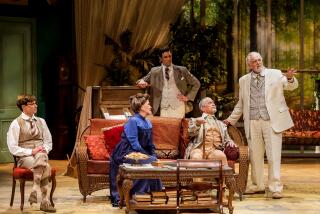âEAST AND WESTâ : COUPLE AT CROSSROADS OF CULTURE
Whenever Soviet or Eastern European emigres decide to go back home, Americans scratch their heads. Isnât everyone over there yearning to breathe free?
In âBetween East and West,â at the Callboard Theatre, a marriage dissolves over this issue. Gregor (Richard Green) wants to stay in America; Erna (Larisa Eryomina) wants to go back to Prague. In an admirable balancing act, playwright Richard Nelson treats both points of view with respect and sympathy. Some differences truly are irreconcilable.
Ernaâs position needs more explaining than Gregorâs. Or perhaps explaining isnât the right word. She is homesick. This must be felt, not rationalized. She doesnât give America much of a chance (she watches 10 seconds of American television before scoffing), but to her such concerns are irrelevant.
Nelson wisely refrained from giving Erna a lot of monologues about the sun coming up over the Vlatava. Those of us who have never seen the Vlatava might not understand.
Instead, we see Ernaâs suffering. Itâs in the clouded gaze of Eryomina (herself a Soviet emigre), as Erna mopes around her Manhattan sublet. Itâs in the temporary light in her eyes when she tries to seduce Gregor into going back by showing him photos of the old days and serving him a Czech wine.
Finally, she collapses in sorrow over a phrase from an English lesson. And, late in the play, we see that the language barrier is more troubling for her than it would be for most immigrants. For in Prague, she was an actress, yet here she canât speak the language. Her attempts to do so, while rehearsing a scene from âThree Sisters,â are funny and sad at the same time.
Gregor is a director. Not only does he speak English better than his wife, but he wouldnât have to speak it in public, from a stage, as she would. So the language doesnât bother him.
What bothers him are memories of repression in Prague. And when his wife pulls out the photo album in order to soften him up, her strategy backfires. The photos remind him of why he left.
Not that everything works out for Gregor. Unable to find work as a director, he considers driving a cab. Finally heâs offered a play in Hartford. His wife is astounded that Americans take a mere five weeks to stage a play; still, thatâs five too many weeks away from Erna. This is a woman who summons up the courage to go outdoors only if her destination is the Czech consulate.
Occasionally, Nelson hints of a dimension outside these two people. Whenever they turn on the TV news, we hear reports of the controversy over American missiles in Europe. The play was first produced in 1984; the recent agreement to dismantle those missiles dates these brief moments.
Still, as a study of a couple at a crossroads, âBetween East and Westâ has a timeless quality. Homesickness and hope are not topical emotions. Neither is the pain thatâs felt when two lovers split up.
Staged by Pavel Cerny, himself a Czech immigrant, the performances are true and touching. Although the blackouts between scenes are long and cumbersome, Green and Eryomina pace themselves well, revealing only so much with each scene, letting the cumulative effect build.
Oscar Schwarzâs set isnât quite right. It looks artificial instead of authentically tacky. But the worst thing about the production is the temperature of the theater during the matinee, as well as the creak of the Callboard floor whenever someone in the audience comes or goes. Itâs not an ideal venue, but itâs an intriguing play.
Performances are at 8451 Melrose Place, Thursdays through Saturdays at 8 p.m., Sundays at 2 p.m., through Nov. 1. Tickets: $15; (213) 852-9205.
More to Read
The biggest entertainment stories
Get our big stories about Hollywood, film, television, music, arts, culture and more right in your inbox as soon as they publish.
You may occasionally receive promotional content from the Los Angeles Times.










